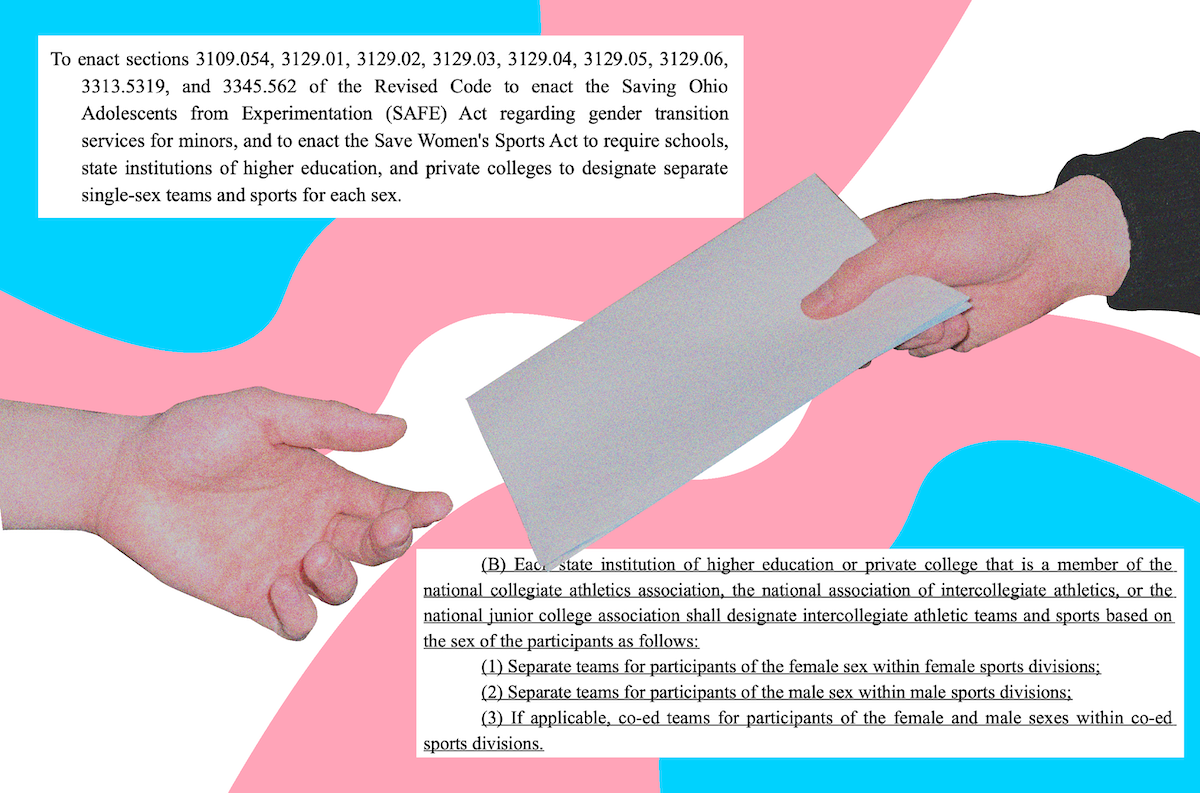
Trans athletes from out of state teams traveling to Ohio to play in any competition will also be barred from play. The Ohio state Senate will vote on Governor DeWine’s veto on Jan. 24. Graphic by Julia Garrison ’25.
Zach Perrier
Viewpoints Editor
Despite opposition and setbacks, the Ohio State Legislature came one step closer to passing House Bill 68, an overarching bill that, if passed, will broadly regulate the lives of transgender people living in the state of Ohio.
House Bill 68 is the combination of two proposed acts, the Stop Ohio Adolescents from Experimentation (SAFE) Act and the Save Women’s Sports Act. The SAFE Act, drafted by Ohio State Representative Gary Click, puts restrictions on healthcare for transgender minors. The Save Women’s Sports Act, originally drafted by Ohio State Representative Jena Powell, bans transgender people from playing on high school and state and private college sports teams of their gender identity.
Despite House Bill 68 passing through the Republican-dominated Ohio State Legislature, Governor Mike DeWine vetoed the bill, arguing that parents – not the government – should make decisions on children’s health. As a possible compromise, DeWine signed an executive order that banned gender transition surgeries on minors. Left out of this executive order was any mention of transgender student athletes.
Skeptical of DeWine’s actions, Republican legislators argued for the importance of the Save Women’s Sports Act as part of House Bill 68. State Representative Haraz N. Ghanbari, whose district includes suburban Toledo and Bowling Green, stated in a press release that “[DeWine’s] failure to support the legislature’s efforts to protect our children and ensure that females can compete on a level playing field, not against biological males, is both frustrating and disheartening.”
In addition to placing restrictions on young transgender athletes, the law would also stop transgender athletes on teams of their gender identity from other states playing against schools in Ohio, like Wooster. In other words, traveling teams from other states playing in Ohio would have to bar their transgender students from playing.
Gary Click, state representative of Ohio’s 88th district and sponsor of House Bill 68, stated in an interview with the Voice that the current rules allowing transgender athletes to play on teams of their gender identity “make women second-class citizens.”
“[House Bill 68] is going to protect the young ladies of Wooster… it’s going to protect the right to fair competition… hormones don’t normalize the playing field,” Click said. Click also stated that the purpose of the bill was to hinder the transgender policies of the National Collegiate Athletic Association (NCAA), which he stated was an unelected bureaucracy that had overstepped its responsibilities. “Their role is to tell us what a foul is, it’s not tell us what a woman is,” Click stated.
Al Landis, Ohio state senator whose district includes Wooster, was not able to be reached for comment but sent the Voice a statement arguing in support for overriding the governor’s veto in the state Senate.
When the Save Women’s Sport’s Act was first introduced in the Ohio state legislature, the Office of Sexuality and Gender Inclusion (SGI) met with the Athletics department to discuss the possibilities of the bill’s passage on Wooster’s athletic programs. Jake Marion, director of sexuality and gender inclusion, told the Voice that the ad hoc group “didn’t come up with anything solid.”
Since then, there have been no additional meetings to address the passage of House Bill 68 between the Athletics department and SGI, but Marion stated that the changes to the bill’s text from various committees in the legislature makes coming up with any concrete plan difficult. “We don’t always know what we can do until things are finally passed… the text changes so frequently,” Marion said.
“We were all hoping that the governor would veto,” said Keri Alexander Luchowski, executive director of the North Coast Athletic Conference (NCAC). Luchowski is a liaison between the NCAA and the collective NCAC along with its individual members, which includes Wooster.
Luchowski and administration for the NCAC had preparations for the ramifications of the bill’s passage. This included speaking with legal counsels on the immediate consequences that the bill’s passage could have on transgender athletes in the NCAC.
“I think this is an unfortunate bill and soon to be law,” Luchowski stated. “I think we’re overall with this law trying to solve problems that are not as much of a problem as the law makes it out to be, and I think it’s just unfortunate that we would limit participation and healthcare for individuals based on politics.”The Ohio State Senate will vote on overriding the governor’s veto of House Bill 68 during its Jan. 24 session, where the bill is expected to pass.

